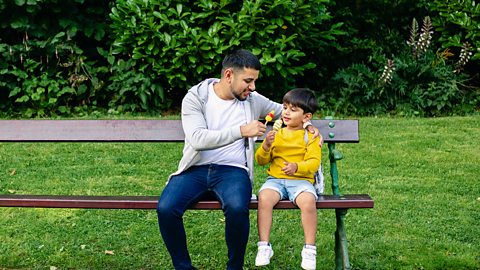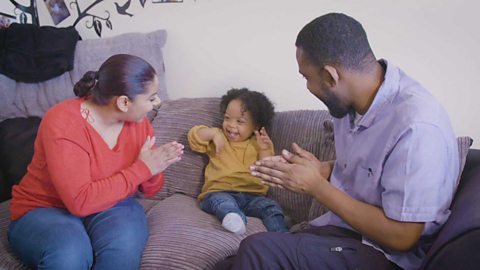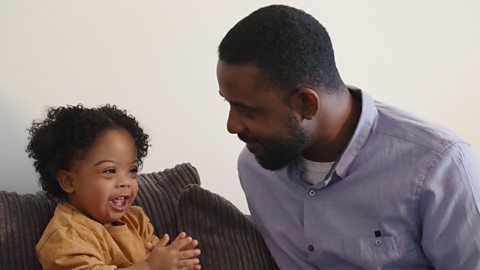One way your child learns language is by repeating what you say and what they hear around them. This is called echolalia and is a totally normal part of their development.
For most children, itÔÇÖs not long before they start using their own phrases and sentences. But some may need help to get beyond this repeating stage while for others, it could be a sign of another underlying issue.
Speech and Language Advisor Claire Smith says, ÔÇ£Children often use echolalia because they are still developing skills in understanding words. There are lots of simple things we can do to help them understand more and move on to the next stage of language development.ÔÇØ
We chatted with Claire, from Speech and Language UK, to find out more about echolalia and when your child might need extra support.
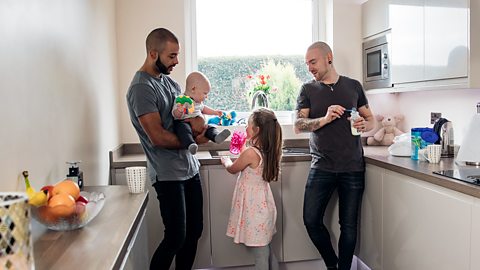
What is echolalia?
Children with echolalia repeat words, sounds or phrases theyÔÇÖve heard. It might be the exact phrase youÔÇÖve said - for example your child might repeat, ÔÇ£What do you want for dinner?ÔÇØ back to you. Or it might be longer sentences and phrases theyÔÇÖve heard from their favourite cartoon, complete with the same accent as the character theyÔÇÖre copying.
ÔÇ£Echolalia is a normal part of child developmentÔÇØ, says Claire. ÔÇ£As children learn to talk and understand words, they imitate, copy or echo the sounds and words they hear. Over time, a child usually learns to talk by connecting new words together to make unique little phrases or sentences.ÔÇØ
When do children stop using echolalia?
Usually by the age of 3, children will be creating their own sentences to communicate. If your child is still only using words and phrases theyÔÇÖve heard other people use - and not using any of their own words - this could be a sign they are echolalic.
Is echolalia always linked with autism?
Echolalia is common in children and adults who are autistic, or with autism spectrum disorder (ASD). But just because your child is repeating words and phrases doesnÔÇÖt mean they are autisitc, says Claire. ÔÇ£Look at the bigger picture. Is their echolalia the only thing youÔÇÖre a bit concerned about? Or are there other things going on: are they having difficulty understanding things people are saying to them, learning new words, how are they getting on with pretend play and socialising or being interested in others?ÔÇØ
If you are concerned about your childÔÇÖs progress, you could try which may give you an idea if you need to seek further help. ItÔÇÖs always worth speaking to your GP if you are worried.
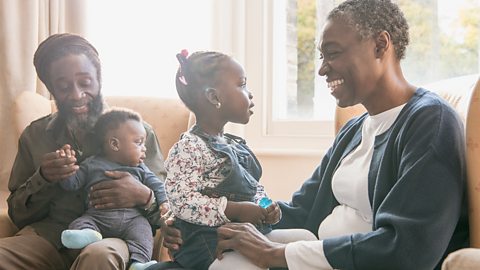
Are there different kinds of echolalia?
When children repeat words right after they hear them, itÔÇÖs known as immediate echolalia.
ÔÇ£Think about when youÔÇÖre learning something new, it takes a bit of timeÔÇØ, says Claire. ÔÇ£Your child repeating what youÔÇÖve just said can feel a bit meaningless at the start. But itÔÇÖs really useful for parents to think about it as supporting their childÔÇÖs language development. Children use copying as a way to start learning language.ÔÇØ
When children repeat words theyÔÇÖve heard at a later time, itÔÇÖs known as delayed echolalia.
Claire says, ÔÇ£Delayed echolalia may seem very unusual because these sentences are used out of context. For example, your child might enjoy watching a cartoon in the morning, and then repeat, ÔÇÿMummy Pig says itÔÇÖs time for dinnerÔÇÖ when you are out shopping or playing in the park. What your child is probably trying to tell you is ÔÇÿI am hungry, let's go and have dinner nowÔÇÖ. It might take a while to work out the meaning! Think about where and when your child might have heard the phrase they used, this will help you to be an echolalia detective.ÔÇØ
Why else do children use echolalia?
Sometimes children will echo words for different reasons, says Claire. ÔÇ£It allows thinking or processing time and practice at talking. For some children, repeating familiar words out loud might feel comforting and calming ÔÇô a bit like when we watch the same TV shows or re-read books.ÔÇØ
Does echolalia go away?
For most children, echolalia does go away. But even if your child is still repeating lots of words and phrases, try not to worry. ÔÇ£We used to think of echolalia as a problem to be fixed and now we think of it as a stepping stone to more independent language developmentÔÇØ, says Claire. ÔÇ£ItÔÇÖs not just copying. It can be helpful for children and help equip them to start using language.ÔÇØ
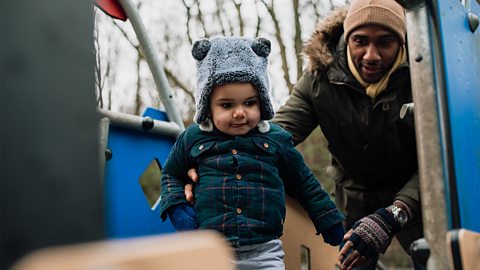
How can I help my child with echolalia?
There are lots of simple things you can do, says Claire.
1. Keep it simple
ÔÇ£Just because your child can talk using long, echolalic memorised sentences doesnÔÇÖt mean they understand languageÔÇØ, says Claire. ÔÇ£Make language easier to understand. Rather than using long sentences, break them into smaller chunks that are easier to understand and use simple words.ÔÇØ
2. Model short phrases
Your child needs to hear simple words in context to connect the meaning with the words. When they are playing, Claire suggests giving a short commentary on what they are doing. ÔÇÿYouÔÇÖre playing with your car. Your big carÔÇÖ, for example. ÔÇ£You are giving them the words they can then link to objects.ÔÇØ
3. Avoid questions
Question words are harder to understand than naming words (nouns) or doing words (verbs). And you might find your child just echoes your question back to you, says Claire. But you may turn questions into comments to make it easier to understand.
For example:
ÔÇÿWho is here?ÔÇÖ would be ÔÇÿGrandad is hereÔÇÖÔÇÿWhat are you playing withÔÇÖ would be ÔÇÿCars, you have carsÔÇÖÔÇÿAre you tired?ÔÇÖ would be ÔÇÿYouÔÇÖre tiredÔÇÖ
It can seem hard to change questions into comments ÔÇô it takes a lot of thinking about and practice. However, it's really worth the effort as you are helping your child to learn new useful words and phrases.
4. Give choices
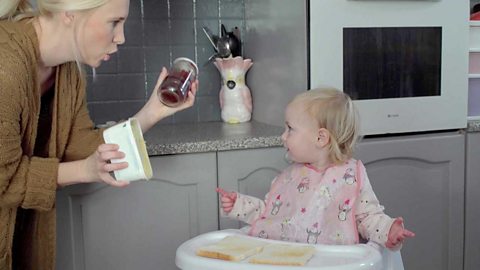
This is a really good way to help children use and understand new words. At snack time you could ask, ÔÇÿbanana or orange?ÔÇÖ or ÔÇÿblue plate or yellow plate?ÔÇÖ Always follow up by giving them the thing they asked for, then they can start to see that words are meaningful.
5. Be visual
When asking the choice questions above, make sure to clearly show your child the options. This means they can make choices based on what they see rather than the words they hear. And use visual ÔÇÿpropsÔÇÖ to help them learn new words. When you say, ÔÇÿTime for a nappy changeÔÇÖ, hold up a nappy for them to see.
6. Respond
Its always a good idea to respond to your childÔÇÖs echolalia and try and work out what it might mean. Even if you get it wrong, itÔÇÖs showing your child that they have communicated something important to you and you have listened.

If you are concerned about your child's progress with their speech, it's worth speaking to your health visitor or GP. Or for advice, you can

